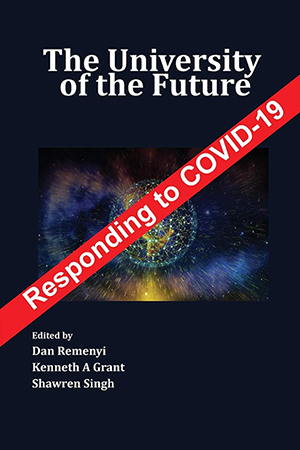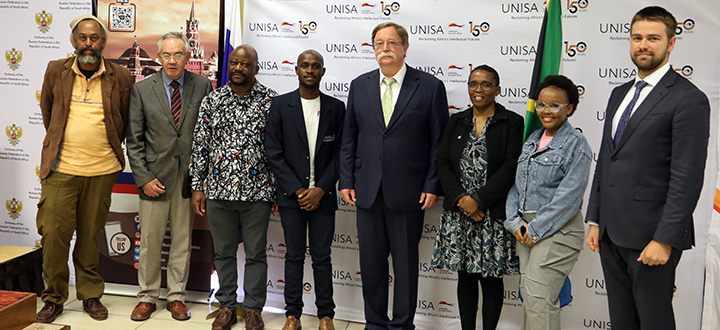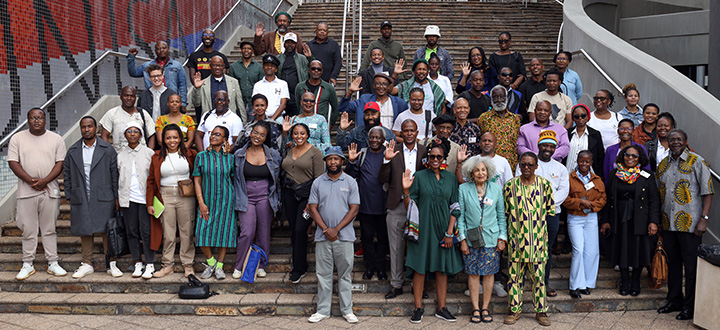College of Science, Engineering & Technology
Profound changes in how universities function
 A recently published book asks the question, "Who could have imagined the upheaval of the first six months of 2020?" It is now common to hear our present plight being described as a "once-in-a-century event", and we all hope that we won’t have to face another crisis like this for quite some time…maybe in a hundred years from now! Who can really imagine how the multiple disruptions, which our society is now facing, will actually play out in the future? We are now faced with so many imponderables; who has any real idea what the endgame of this crisis will look like, that is, if there is one?
A recently published book asks the question, "Who could have imagined the upheaval of the first six months of 2020?" It is now common to hear our present plight being described as a "once-in-a-century event", and we all hope that we won’t have to face another crisis like this for quite some time…maybe in a hundred years from now! Who can really imagine how the multiple disruptions, which our society is now facing, will actually play out in the future? We are now faced with so many imponderables; who has any real idea what the endgame of this crisis will look like, that is, if there is one?
Any speculations about how we are going to recover are bound to be, at best, simplifications. What can be said, with some certainty, is that the situation is highly complex and that it is imperative that we address the many challenges we now face with a creative mind-set and all the energy and resources that we can muster, to prevent as much damage as possible. Increasingly, people are talking about Covid-19 as being endemic and they further caution that we have to adjust to be able to survive, as it is now deeply rooted in our society. If this is the case, then we have to work to keep the virus as constrained as possible.
There are several sectors in our society that have been especially hard-hit by the Covid-19 measures and, one of these is the education sector. Primary, secondary and tertiary education institutions have had to sharply adjust to comply with the new world we now find ourselves in, especially with regard to social distancing rules.
Millions of university students have had to embark on or continue their university education while facing a range of challenges, including the following five:
- Universities had to re-develop their basic approach to teaching and learning. The face-to-face lecture is largely a thing of the past as online lectures have become the norm. Many regard this as not a bad thing. Lecturing is notoriously regarded as a poor mode of communication and it is an open secret among academics that not many university teachers are gifted teachers, especially when dealing with large groups. A further advantage of online lectures is that they are normally recorded; students, therefore, can replay the presentations if they need to listen to them again.
- Online tutorials, workshops and laboratories will have to be delivered in new ways and these will have to be creatively scheduled, maybe even during unsocial hours. This will be very challenging for many universities as well as for their students. Having students working in groups or, as some call them, bubbles can help in this respect.
- Universities will have to offer much more support to students and staff, mostly through the use of online tools or remotely. Universities have a duty of care to their students and staff and this has to be taken even more seriously under the conditions of the Covid-19 crisis. Today, the ability of ICT to support the academy is limited, but there is a tsunami of products on the way, including artificial intelligence (AI), which will offer a variety of support options.
- The universities’ finances will have to be restructured. Social distancing is expensive; some would say very expensive. Many of the facilities available at universities, such as large lecture theatres, will either be largely unused or sub-optimally used. Examples include student canteens and recreational facilities, which may very well find themselves in financial difficulty due to restrictions on their use. These are not the only challenges. Some students have been asking why there hasn’t been a reduction in their fees, as they are not getting the campus time they would usually get. This is a fair question, but it does not take into account that the vast majority of university expenses is a fixed cost and, thus, the universities’ expenses remain the same, whether the university is operating with the maximum number of students or only a small proportion of that number. However, for some universities, there will be a very big hole in their revenue due to the loss of support from high-fee-paying overseas students, whose movements have been severely curtailed and it is unlikely that they will return for quite some time. Within the system, it may be necessary to introduce some severe economic cutbacks. This could be in the form of redundancies or across-the-board salary reductions.
- The many social and sporting activities will have to be re-envisaged. Controlled sporting activities may resume in a limited way very soon. Historically, social activities have always underpinned academic life, but in the future, more care will have be practiced. Many people are now seeing this issue as the Achilles’ heel or, as others would say, the Trojan horse of university life. On campuses, there is a greater risk of passing on the virus through social and sporting activities than in any other way, and, therefore, these activities will have to be very carefully monitored and controlled.
- Examinations will have to be redesigned, as there will be resistance to having large numbers of students congregating in big examination halls. Remote examinations are intrinsically problematic, as these create opportunities for students to cheat. Students could, for instance, acquire substitutes to undertake the examination on their behalf. There are, of course, a number ways of coping with the situation, but, at the end of the day, our academic system relies on the student to have some degree of integrity and, although there will always be those who wish to cheat, the vast majority of students are more inclined to be honest.
These are not the only issues that universities face. It is quite important to note that the relative importance of any of these issues is a function of the type of university, its history, and how it wants to develop into the future. Covid-19 has indeed accelerated the trend towards blended learning, but some universities prefer to use online facilities in a minimal way, while other universities have embraced online tools as the future bedrock of their teaching and learning strategy.
Unisa, which has been a distance learning university since 1946 (it was incorporated in 1873), is well placed to play an especially important role in the University of the Future, in both South Africa and much further afield. It has a wealth of experience, which many other universities are going to have to acquire through the more painful process of trial and error.
The issues mentioned above, as well as many others, are addressed in the new book, The University of the Future: Responding to Covid-19, published recently by ACIL (UK), in print and PDF. The book comprises the views of 32 authors, from 17 countries, on 5 continents. The book is edited by Dan Remenyi, Ken A Grant, and Shawren Singh, with contributions from vice-chancellors, academics and consultants. Prof Mandla Makhanya, Principal and Vice-Chancellor of Unisa, has contributed a chapter.
The University of the Future: Responding to Covid-19 (ISBN 978-1-912764-65-5) is available here.
* By Dan Remenyi, Academic Director: Academic Conferences and Publishing International and Extraordinary Professor, University of the Western Cape. He was formerly an Academic Research Associate in the School of Computing at Unisa.
Publish date: 2020-10-09 00:00:00.0

 Unisa's student leadership engage with Russian ambassador
Unisa's student leadership engage with Russian ambassador
 Re-igniting and re-imagining Pan Africanism, Afrocentricity and Afrofuturism in the 21st century
Re-igniting and re-imagining Pan Africanism, Afrocentricity and Afrofuturism in the 21st century
 Young Unisa science stars join elite Lindau Nobel Laureate group
Young Unisa science stars join elite Lindau Nobel Laureate group
 Education MEC addresses Unisa autism seminar
Education MEC addresses Unisa autism seminar
 Seven Unisans nominated for the NSTF-South32 Awards 2023/2024
Seven Unisans nominated for the NSTF-South32 Awards 2023/2024